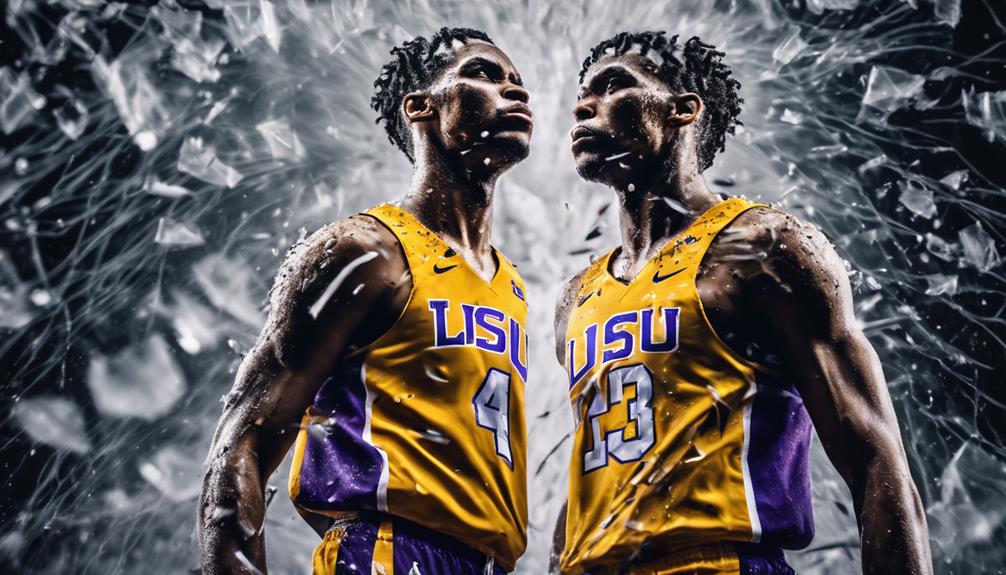LSU basketball sensation Angel Reese has taken a stand against the malicious misuse of AI technology after becoming a victim of an AI-generated fake nude photo scandal. She swiftly denounced the scandal, showcasing her strength and character in the face of adversity. Reese remained focused on her basketball career, refusing to let the controversy overshadow her accomplishments. The incident serves as a reminder of the dark side of AI and its potential to destroy reputations and cause distress. With her resilience and determination, Reese has set an example for others, and as the story unfolds, the importance of addressing AI misuse and privacy concerns becomes increasingly clear.
Key Takeaways
• Angel Reese swiftly addressed AI-generated fake nude photos, showcasing strength and character in her response.
• She refused to let the controversy overshadow her basketball career, remaining laser-focused on her sport.
• The scandal highlighted the dark side of AI, emphasizing the need for accountability and regulation in the industry.
• Reese's resilience serves as an example for others, demonstrating that one's reputation and career can withstand online attacks.
• The incident raises concerns about privacy in the digital age, emphasizing the importance of online consent and technology misuse prevention.
Angel Reese Takes a Stand
By swiftly addressing the AI-generated fake nude photos circulating online, Angel Reese took a bold stand against the malicious misuse of technology. She clarified on social media that she'd never pose nude, denouncing the fake images.
Her fans rallied behind her, condemning the malicious act. Reese's swift response showcased her strength and character, refusing to let the controversy overshadow her basketball career.
Focus Amidst the Controversy

Despite the controversy surrounding the AI-generated fake nude photos, Angel Reese remains laser-focused on her basketball career. Her determination to succeed in the sport hasn't wavered, even in the face of adversity. Reese's supporters have encouraged her to stay focused on winning a championship, and she's heeding their advice.
Her talent in basketball continues to shine despite the distractions, and her resilience in the face of adversity sets an example for others. With her team, LSU, as a three-seed in the Albany bracket for March Madness, Reese is more determined than ever to defend their championship title under coach Kim Mulkey.
The Dark Side of AI

Angel Reese's experience serves as a stark reminder of the dark side of AI, where technology can be misused to create fraudulent content that destroys reputations and causes emotional distress. The ease with which AI-generated fake images can be created and disseminated highlights the necessity for vigilance in the digital age.
| Consequences of AI Misuse | Examples |
|---|---|
| Reputation Damage | Angel Reese's fake nude photos |
| Emotional Distress | Celebrities like Taylor Swift facing similar issues |
| Loss of Trust | Erosion of faith in online content |
The incident also raises questions about accountability and regulation in the AI industry. As AI technology advances, addressing the ethical implications of its misuse is crucial.
Privacy in the Digital Age

In the digital age, privacy has become a luxury that few can afford, as evidenced by the ease with which AI-generated fake images can compromise individuals' reputations and personal lives. The recent scandal involving LSU basketball star Angel Reese, where AI-generated fake nude photos circulated online, highlights the importance of privacy in the digital age.
This incident raises concerns about online consent and the misuse of AI technology.
The ease of creating and disseminating fake images online has severe consequences for individuals' reputations and personal lives. The lack of regulation and accountability in the digital sphere exacerbates the problem.
It's essential to establish stricter regulations and hold individuals accountable for creating and sharing fake content.
Resilience in the Face of Scandal

By standing firm against the fake images, Angel Reese demonstrates unwavering resilience, refusing to let the scandal tarnish her reputation or derail her basketball career.
Despite the online frenzy, Reese's focus remains unwaveringly on the court, where her talent continues to shine. Her supporters have rallied behind her, urging her to stay focused on winning a championship.
Reese's determination to succeed in basketball remains unshakeable, setting an inspiring example for others facing adversity.
Frequently Asked Questions
How Can Individuals Protect Themselves From Ai-Generated Fake Images?
Individuals can protect themselves from AI-generated fake images by taking several precautions. These include being cautious when sharing personal photos online, avoiding suspicious links, and verifying the authenticity of images through reputable sources.
Additionally, utilizing reverse image search tools can help identify manipulated images. If any suspicious content is detected, individuals should report it to the platform or authorities.
Are There Legal Consequences for Creating and Sharing Fake Images?
Are there legal consequences for creating and sharing fake images?
Yes, individuals can face legal action for creating and disseminating AI-generated fake images, including defamation, privacy violation, and copyright infringement claims. Depending on the jurisdiction, perpetrators may be liable for damages, fines, or even criminal charges.
In some cases, platforms and websites may also be held accountable for hosting or promoting such content.
Can Ai-Generated Images Be Completely Removed From the Internet?
As the digital landscape resembles a vast, uncharted ocean, completely removing AI-generated images from the internet seems an intimidating challenge, akin to searching for a needle in a haystack.
While algorithms can detect and eliminate some fraudulent content, the sheer volume and rapid proliferation of AI-generated images make total removal a formidable task.
Additionally, the internet's decentralized nature and lack of universal regulations hinder efforts to eradicate these images entirely.
How Can Social Media Platforms Prevent the Spread of Fake Images?
To prevent the spread of fake images, social media platforms can implement advanced AI-powered detection tools to identify and remove fraudulent content. Additionally, they can establish stricter content moderation policies, increase user reporting options, and collaborate with fact-checking organizations to verify the authenticity of images.
What Are the Long-Term Effects of Ai-Generated Fake Images on Victims?
As the old adage goes, 'a picture is worth a thousand words,' but what happens when those pictures are fake?
The long-term effects of AI-generated fake images on victims can be devastating, causing emotional distress, reputational damage, and even financial loss. The psychological impact can linger, affecting self-esteem, confidence, and overall well-being.
Additionally, the anonymity of the internet allows perpetrators to remain hidden, making it difficult for victims to seek justice.
Conclusion
As the dust settles, Angel Reese emerges stronger, her resolve unshaken by the AI-generated scandal. With a steadfast focus on her basketball career, she's become an unwitting beacon for online privacy and consent.
Her story serves as a stark reminder of the darker side of AI misuse, where fabricated images can spread like wildfire without consent.
As Reese takes the court, her determination is a powerful affirmation to the importance of accountability in the digital age.










